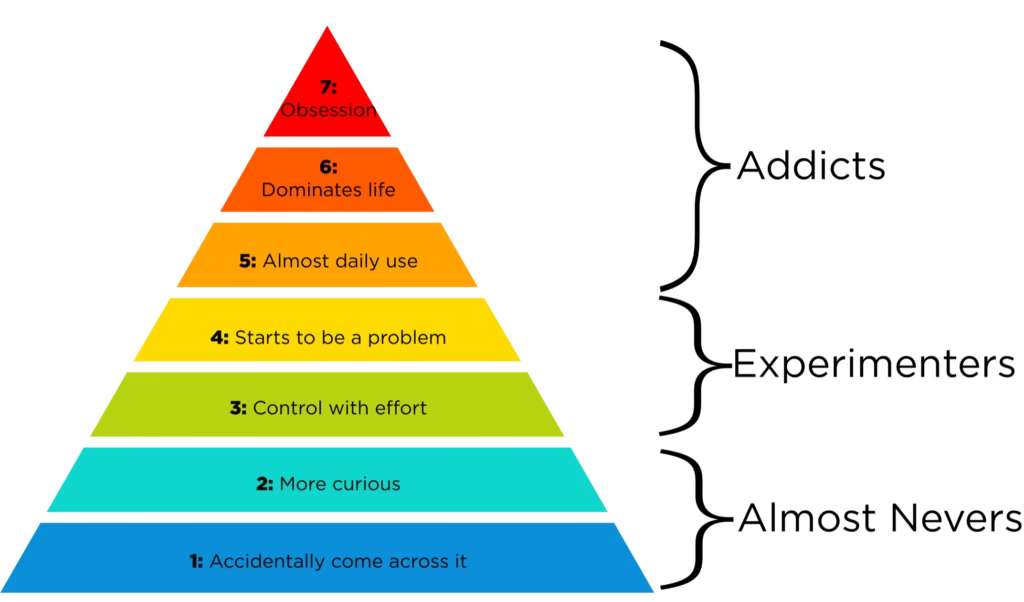Pornography addiction has emerged as a significant behavioral health concern affecting individuals across all demographics in Singapore.
This progressive mental health condition, characterized by compulsive consumption of explicit content despite harmful consequences, requires specialized treatment approaches to achieve lasting recovery.
Read more: Sex Addiction Treatment in Singapore
Understanding Pornography Addiction

Pornography addiction represents a complex behavioral disorder involving the compulsive viewing of explicit sexual content that interferes with daily functioning.
Unlike occasional consumption, this condition manifests as an inability to control viewing habits despite experiencing negative impacts on personal, professional, and social relationships.
The addiction operates similarly to substance dependencies, affecting the brain’s reward pathways through excessive dopamine release.
Over time, individuals develop tolerance, requiring increasingly explicit or frequent content to achieve the same level of stimulation.
This progressive nature makes early intervention crucial for successful treatment outcomes.
Medical professionals recognize this condition as falling under compulsive sexual behavior disorders, though diagnostic criteria continue to evolve.
The World Health Organization’s International Classification of Diseases acknowledges compulsive sexual behavior disorder, with pornography consumption being the primary concern among diagnosed patients.
Related article: Complete Guide to Depression Therapy in Singapore
Recognizing the Signs and Symptoms
Understanding the warning signs enables individuals and families to seek appropriate help before the condition severely impacts quality of life.
The symptoms typically manifest across multiple life domains:
Behavioral Indicators:
- Persistent inability to reduce or stop pornography consumption despite repeated attempts
- Escalating viewing patterns requiring more explicit or extreme content for satisfaction
- Continuing consumption even when experiencing negative emotions or consequences
- Spending excessive time viewing content at the expense of responsibilities
- Secretive behavior regarding viewing habits
- Viewing content in inappropriate settings or during work hours
This might help: Which Psychologist in Singapore Should You Consider? (Sort by Reviews)
Emotional and Psychological Signs:
- Intense shame and guilt following viewing sessions
- Preoccupation with sexual thoughts throughout the day
- Frustration or anger when unable to access content
- Depression and anxiety related to viewing behaviors
- Decreased satisfaction with real-life intimate relationships
- Social withdrawal and isolation from family and friends
Life Impact Indicators:
- Deteriorating work or academic performance
- Neglecting important personal responsibilities
- Financial strain from purchasing premium content or services
- Relationship conflicts and breakdown
- Loss of interest in previously enjoyed activities
- Sleep disturbances due to late-night viewing
Related article: Which Psychiatrist in Singapore Should You Consider?
Contributing Factors to Pornography Addiction

Multiple interconnected factors contribute to the development of this addiction, making comprehensive treatment essential for addressing root causes.
Technological Accessibility: The widespread availability of high-speed internet and mobile devices has created unprecedented access to explicit content.
Features like private browsing modes provide perceived anonymity, reducing inhibitions around consumption.
The constant availability of new content feeds into addictive patterns through intermittent reinforcement.
Psychological Vulnerabilities: Individuals experiencing depression, anxiety, trauma, or chronic stress often turn to pornography as an escape mechanism.
Those with poor emotional regulation skills may use viewing as a coping strategy for managing difficult feelings.
Past experiences of abuse or neglect can also predispose individuals to developing problematic sexual behaviors.
Read more: Psychotherapy in Singapore: Types, Benefits, and How to Get Started
Social and Cultural Factors: Cultural stigma surrounding sexuality and addiction prevents many from seeking help early.
Misconceptions about pornography addiction being a prelude to criminal behavior further discourage help-seeking. Social isolation, particularly during events like the COVID-19 pandemic, has contributed to increased problematic usage patterns.
Neurobiological Factors: Genetic predisposition to addictive behaviors may increase vulnerability. The adolescent brain’s ongoing development makes young people particularly susceptible to developing compulsive patterns.
Early exposure during formative years can significantly impact sexual development and relationship expectations.
The Growing Concern in Singapore
Recent data from addiction recovery centers in Singapore reveals alarming trends in pornography addiction cases. Treatment facilities report a doubling of individuals seeking help for compulsive sexual behaviors, with pornography consumption being the primary concern.
Statistical insights show that approximately 70% of new cases involve pornography-related compulsive behaviors. The average age of those seeking treatment is in their twenties, though cases involving adolescents as young as 12 have been documented.
Less than 10% of current cases involve individuals under 18, though experts believe many younger individuals remain undiagnosed.
The pandemic significantly accelerated these trends, with increased screen time, boredom, and stress contributing to problematic usage patterns.
Healthcare professionals report seeing highly educated professionals who cannot function through their day without consuming explicit content, highlighting that this condition affects individuals regardless of socioeconomic status or education level.
You might like: Insomnia Treatment in Singapore
Categories of Sexual and Pornography Addiction

Understanding the various manifestations helps in developing targeted treatment approaches. Mental health professionals typically classify these addictions into distinct categories:
Related article: Anxiety Therapy in Singapore: Treatment and Recovery
| Category | Description | Treatment Focus |
|---|---|---|
| Anonymous | Compulsive engagement with unknown partners | Developing healthy attachment patterns |
| Fantasy-based | Obsession with sexual fantasies replacing genuine intimacy | Reality-based relationship skills |
| Intrusive | Non-consensual touching or using power positions for sexual access | Consent education and power dynamics |
| Voyeuristic | Secret observation of sexual acts while masturbating | Privacy respect and healthy boundaries |
| Pain Exchange | Sexual obsession with causing or receiving pain | Safe, consensual relationship practices |
| Exhibitionist | Public sexual activity or unsolicited exposure | Appropriate social behavior training |
| Transactional | Paying for sexual services to avoid genuine connection | Emotional intimacy development |
| Exploitative | Sexual activity against someone’s will | Legal consequences and specialized intervention |
Treatment Options Available in Singapore
Singapore offers various evidence-based treatment approaches for pornography addiction, ranging from outpatient counseling to intensive residential programs.
Outpatient Treatment Programs: These programs allow individuals to maintain their daily responsibilities while receiving specialized care.
Sessions typically include individual therapy, group counseling, and educational workshops about healthy sexual behavior.
This approach works well for high-functioning individuals who can manage their addiction within their regular routines.
Intensive Outpatient Programs: For individuals requiring more structured support, intensive outpatient programs provide multiple sessions per week.
These programs combine individual therapy with group sessions, family counseling, and skill-building workshops. Participants learn coping strategies, relapse prevention techniques, and healthy relationship skills.
Residential Treatment Facilities: When outpatient treatment proves insufficient, residential programs provide 24-hour care and support.
These facilities offer comprehensive treatment addressing both the addiction and underlying mental health conditions. The structured environment removes external triggers while individuals develop new coping mechanisms.
Therapeutic Approaches Used: Singapore’s treatment centers employ various evidence-based methodologies including Dialectical Behavior Therapy (DBT), Cognitive Behavioral Therapy (CBT), and behavioral activation techniques.
These approaches help individuals understand their triggers, develop emotional regulation skills, and create healthy behavioral patterns.
Why Professional Help is Essential
Attempting to overcome pornography addiction without professional support rarely results in lasting recovery.
The complex nature of this condition requires specialized knowledge and structured intervention approaches.
Specialized Assessment and Treatment Planning: Professional treatment begins with comprehensive assessment tools that evaluate the severity of addiction, underlying mental health conditions, and individual risk factors.
Treatment centers use standardized instruments like the Sexual Addiction Screening Test (SAST) and Sexual Dependence Inventory (SDI 4.0) to develop personalized treatment plans.
Expert Mental Health Professionals: Qualified addiction specialists, psychologists, and psychiatrists possess the specialized knowledge necessary for treating pornography addiction.
These professionals understand the neurobiological aspects of addiction and can address co-occurring mental health conditions that often accompany behavioral addictions.
Comprehensive Support Networks: Treatment facilities provide essential peer support through group therapy sessions with individuals facing similar challenges.
This support network reduces isolation and shame while providing accountability and encouragement throughout the recovery process.
Addressing Underlying Issues: Professional treatment addresses root causes rather than just symptoms. This includes processing past trauma, developing emotional regulation skills, improving relationship patterns, and addressing co-occurring mental health conditions like depression or anxiety.
The Treatment Process in Singapore
The journey toward recovery follows a structured approach designed to address all aspects of the addiction while building sustainable coping mechanisms.
Initial Assessment and Intake: The process begins with comprehensive evaluation including medical history, addiction severity assessment, and identification of co-occurring conditions.
Mental health professionals use validated screening tools to understand the scope and impact of the addiction on various life areas.
Individualized Treatment Planning: Based on assessment results, treatment teams develop personalized recovery plans addressing specific needs, goals, and circumstances.
Plans typically include individual therapy frequency, group participation, family involvement, and medication considerations if applicable.
Active Treatment Phase: This phase involves regular therapy sessions focusing on understanding triggers, developing coping strategies, and building healthy relationship skills.
Participants learn about the neurobiology of addiction, practice stress management techniques, and work on underlying trauma or mental health issues.
Relapse Prevention and Maintenance: Treatment includes comprehensive relapse prevention planning with specific strategies for managing high-risk situations.
Ongoing support through alumni programs, support groups, and periodic check-ins helps maintain long-term recovery success.
Family and Partner Support: Many programs include family therapy components to address the impact of addiction on loved ones.
Partners may participate in specialized programs designed to help them understand the addiction and develop healthy boundaries and communication patterns.
Comprehensive FAQ
What exactly constitutes pornography addiction?
Pornography addiction involves compulsive viewing of explicit sexual content that continues despite negative consequences and represents a loss of control over viewing behaviors that significantly impacts daily functioning and relationships.
How common is pornography addiction in Singapore?
Treatment centers report a significant increase in cases, with one major facility seeing cases double from 50 in 2019 to over 100 in 2020, with 70% being new cases, indicating a growing recognition and prevalence of this condition.
At what age do people typically develop pornography addiction?
While the average age of those seeking treatment is in their twenties, addiction often begins much earlier, with some cases involving children as young as 12 who struggle to control their viewing habits after initial exposure.
Can pornography addiction be treated successfully?
Yes, with proper professional treatment addressing both the addictive behaviors and underlying causes, individuals can achieve lasting recovery, though it requires commitment to the treatment process and ongoing support.
What is the difference between regular pornography use and addiction?
The key difference lies in control and consequences – addiction involves inability to stop despite wanting to, continued use despite negative impacts, and viewing that interferes with important life responsibilities and relationships.
How long does treatment typically take?
Treatment duration varies based on individual factors, severity of addiction, and co-occurring conditions, but most programs involve several months of active treatment followed by ongoing support and maintenance phases.
Do I need residential treatment or can outpatient treatment work?
The level of care depends on addiction severity, ability to maintain abstinence in regular environment, presence of co-occurring conditions, and support system availability – many individuals succeed with intensive outpatient treatment.
Will my family need to be involved in treatment?
Family involvement is often beneficial and may be recommended, especially when addiction has impacted relationships, though individual circumstances and preferences are considered in treatment planning decisions.
Is pornography addiction recognized as a mental health disorder?
While not specifically listed in the DSM-5, it falls under compulsive sexual behavior disorders recognized by the World Health Organization, and treatment approaches are well-established and evidence-based.
What happens if I relapse during treatment?
Relapse is often part of the recovery process and does not mean treatment failure – it provides valuable information for adjusting treatment approaches and strengthening coping strategies for future challenges.
Can medication help with pornography addiction treatment?
While no specific medications exist for pornography addiction, treatments for co-occurring conditions like depression or anxiety may be helpful as part of a comprehensive treatment approach.
How can I support a loved one with pornography addiction?
Supporting a loved one involves encouraging professional help, maintaining healthy boundaries, participating in family therapy if recommended, and seeking your own support to manage the impact on your wellbeing.
What should I look for in a treatment provider?
Look for licensed mental health professionals with specialized training in addiction treatment, experience with behavioral addictions, comprehensive assessment approaches, and evidence-based treatment methodologies.
Is online therapy effective for pornography addiction?
While in-person treatment is often preferred for the accountability and support it provides, online therapy can be effective, especially when combined with other support resources and accountability measures.
How do I know if my pornography use is becoming problematic?
Warning signs include inability to reduce viewing despite wanting to, viewing interfering with responsibilities or relationships, escalating to more extreme content, and experiencing shame or distress related to viewing habits.
Conclusion
Pornography addiction represents a serious behavioral health condition requiring professional intervention and comprehensive treatment approaches.
Singapore offers various evidence-based treatment options through qualified mental health professionals who understand the complex nature of this addiction.
Recovery is possible with appropriate support, personalized treatment planning, and commitment to the therapeutic process.
Early intervention improves outcomes and reduces the long-term impact on relationships, career, and overall quality of life.
If you or someone you know is struggling with pornography addiction, reaching out to qualified treatment providers represents the first step toward reclaiming control and building healthier patterns of behavior and relationships.

